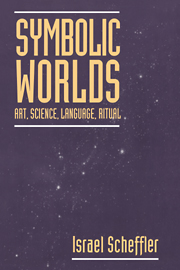Book contents
14 - World-features and discourse-dependence
Published online by Cambridge University Press: 26 March 2010
Summary
I offer now some further comments on my controversy with Nelson Goodman regarding worldmaking. Let me begin with a preliminary remark: I don't much like the elastic term “world” and do not want to be taken as defending some doctrine about the world – arguing that there really is one world, or that the world is the touchstone of truth, or independent of mind, or the like. I should not wish to express any of my philosophical convictions by using this term in a primitive, literal, and essential way. My references employing the term are wholly addressed, in critical vein, to Goodman's uses, or else are to be cashed out by terms denoting more limited and more comprehensible entities. For this reason, I introduced reference to stars, about which sensible and scientifically sound things can be said – for example, that in any case stars were not made by men.
Another preliminary point is this: I do not dispute the sort of relativism, or pluralism, propounded in Goodman's Structure of Appearance, for which, given any prephilosophical subject matter, there are likely to be conflicting though adequate systematizations, the points of conflict falling in the region of “don't cares.” The existence of such systematizations underlies Goodman's espousal of extensional isomorphism rather than identity as a criterion of adequacy for what he calls “constructional systems.”
- Type
- Chapter
- Information
- Symbolic WorldsArt, Science, Language, Ritual, pp. 197 - 201Publisher: Cambridge University PressPrint publication year: 1996



